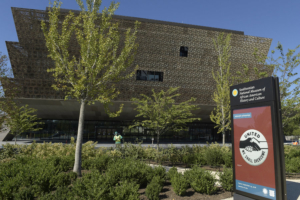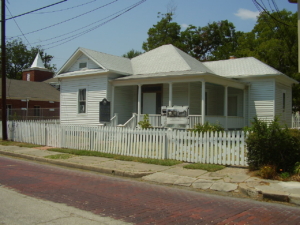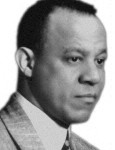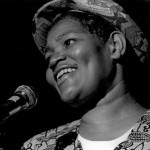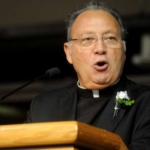How Enslaved Chefs Helped Shape American Cuisine
Black cooks created the feasts that gave the South its reputation for hospitality
Image: The Gilbert Stuart painting “Portrait of George Washington’s Cook” may depict Hercules, the first president’s famous chef. (Courtesy of Wikimedia Commons)
(Smithsonian.com)”We need to forget about this so we can heal,” said an elderly white woman, as she left my lecture on the history of enslaved cooks and their influence on American cuisine. Something I said, or perhaps everything I said, upset her.
My presentation covered 300 years of American history that started with the forced enslavement of millions of Africans, and which still echoes in our culture today, from the myth of the “happy servant” (think Aunt Jemima on the syrup bottle) to the broader marketing of black servitude (as in TV commercials for Caribbean resorts, targeted at white American travelers). I delivered the talk to an audience of 30 at the Maier Museum of Art in Lynchburg, Virginia. While I had not anticipated the woman’s displeasure, trying to forget is not an uncommon response to the unsettling tale of the complicated roots of our history, and particularly some of our beloved foods.
It is the story of people like Chef Hercules, our nation’s first White House chef; and Emmanuel Jones, who used his skills to transition out of enslavement into a successful career cooking in the food industry, evading the oppressive trappings of sharecropping. It is also the story of countless unnamed cooks across the South, the details of their existences now lost. But from its most famous to its anonymous practitioners, the story of Southern cuisine is inseparable from the story of American racism. It’s double-edged—full of pain—but also of pride. Reckoning with it can be cumbersome, but it’s also necessary. The stories of enslaved cooks teach us that we can love our country and also be critical of it, and find some peace along the way. (more)
Architects, urban planners address gentrification of US cities through design
In response to the increasing decline in black populations in major cities, architects and urban planners are reimagining city architecture and drawing inspiration from African-American culture and traditions in efforts to preserve community history despite changing demographics.
(Christian Science Monitor) On a visit to Abuja, Nigeria’s master-planned capital, Nmadili Okwumabua walked away disappointed by the architecture.
“We could have been anywhere but Africa,” she said of the city, whose layout and buildings were mostly the handiwork of a consortium of United States planning and design firms and Japanese architect Kenzo Tange.
Contemporary architecture and urban design have failed to incorporate African and Afro-descended esthetics, Ms. Okwumabua, a Nigerian-American urban planner, believes.
As the National Museum of African American History and Culture, one of Okwumabua’s preferred examples of African-influenced architecture, opened in Washington, D.C. two years ago, the capital city lost its black majority after having become the first in the US with more black than white people.
For Mr. Hood, these demographic shifts are a clarion call for black urban communities to imbue their surroundings with a recognizable heritage. (more)
Students Unearth History In Houston’s Freedmen’s Town
College students paired with young students from Freedmen’s Town dug up a little African-American history near downtown Houston
(Houston Patch) There’s still a bit of buried history in Houston, and a few local students were literally digging some of it up recently.
The Lone Star College-Cy Fair Professor Dr. David Bruner and his students traveled the area known as Freedmen’s Town in Houston’s historic Fourth Ward.
That’s where the archaeology students met up with a group of students from Gregory-Lincoln Education Center and spent the day excavating artifacts.
Freedmen’s Town was founded in 1865, at the end of the American Civil War by former slaves that included Rev. Jack Yates.
The dig took place in the backyard of the Simms House on the Rutherford B. H. Yates Museum property.
“It was amazing getting to teach the kids about archaeology and how to dig and sift for artifacts, said Jasmine Lee, one of Bruner’s students. “Even though they had fun, they really took it seriously and were curious and careful with every find regardless of its importance.”(more)
TIPHC Bookshelf
 Published scholarship on black history in Texas is growing and we’d like to share with you some suggested readings, both current and past, from some of the preeminent history scholars in Texas and beyond. We invite you to take a look at our bookshelf page – including a featured selection – and check back as the list grows. A different selection will be featured each week. We welcome suggestions and reviews. This week, we offer, “Civil Rights in the Texas Borderlands, Dr. Lawrence A. Nixon and Black Activism,” by Will Guzman.
Published scholarship on black history in Texas is growing and we’d like to share with you some suggested readings, both current and past, from some of the preeminent history scholars in Texas and beyond. We invite you to take a look at our bookshelf page – including a featured selection – and check back as the list grows. A different selection will be featured each week. We welcome suggestions and reviews. This week, we offer, “Civil Rights in the Texas Borderlands, Dr. Lawrence A. Nixon and Black Activism,” by Will Guzman.
Physician Lawrence A. Nixon fled the racial violence of central Texas to settle in the border town of El Paso. There he became a community and civil rights leader, working on integration and antilynching cases and cofounding the local NAACP chapter. In 1923, Nixon challenged the law that banned African Americans from voting in the Democratic primary. His victory in two subsequent Supreme Court decisions paved the way for dismantling all-white primaries across the South.
Will Guzmán delves into Nixon’s lifelong, and mostly unknown, struggle against Jim Crow. Linking Nixon’s successful activism to his independence from the white economy, support from the NAACP, and indefatigable courage, Guzmán places Nixon within the context of the larger historical narratives of his era. At the same time, he sheds light on Nixon’s presence in both symbolic and literal borderlands–as an educated professional in a time when few went to college, as someone who made waves when most feared violent reprisal, and as an African American living on the mythical American frontier as well as an international boundary.
Enlightening and powerful, Civil Rights in the Texas Borderlands adds to the growing literature on African Americans in the Southwest while exploring a seldom-studied corner of the Black past and the civil rights movement.
This Week in Texas Black History
Jul 22
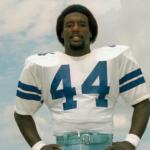 On this day in 2014, Dallas Cowboys‘ great Robert Newhouse passed away from heart disease. Newhouse suffered a stroke in 2010 and had been under treatment at the Mayo Clinic in Rochester, Minn. where he passed away. Newhouse starred at Galilee High School in Hallsville, situated between Longview and Marshall. The University of Houston was the only major school recruiting offer he received and with the Cougars, from 1969-1971, Newhouse set several rushing records and left the school as its all-time single-season rushing leader with 1,757 yards as a senior. That total, at the time, was the second most rushing yards in a season in NCAA history and earned Newhouse second team All-American honors. He was a second round draft pick by the Cowboys in 1972 and played all of his 12 NFL seasons with Dallas. Newhouse led the team in rushing with 930 yards in 1975.
On this day in 2014, Dallas Cowboys‘ great Robert Newhouse passed away from heart disease. Newhouse suffered a stroke in 2010 and had been under treatment at the Mayo Clinic in Rochester, Minn. where he passed away. Newhouse starred at Galilee High School in Hallsville, situated between Longview and Marshall. The University of Houston was the only major school recruiting offer he received and with the Cougars, from 1969-1971, Newhouse set several rushing records and left the school as its all-time single-season rushing leader with 1,757 yards as a senior. That total, at the time, was the second most rushing yards in a season in NCAA history and earned Newhouse second team All-American honors. He was a second round draft pick by the Cowboys in 1972 and played all of his 12 NFL seasons with Dallas. Newhouse led the team in rushing with 930 yards in 1975.
Jul 22
On this day in 1944, Dr. Lawrence Nixon, an El Paso physician, voted in the Democratic primary, the first black voter in the state to do so. The Texas legislature had passed a law in 1923 forbidding blacks from voting in the primary. However, Nixon, working with the NAACP, challenged the law and attempted to vote on July 26, 1924 and was refused a ballot. Twice the U.S. Supreme Court ruled in his favor, however, the state Democratic Party found legal loopholes (including asserting the party was a private organization and could set restrictions on who could vote) to continue preventing blacks from voting in the primary. Finally, as a result of the Court’s ruling in Smith v. Allwright (where Lonnie Smith had brought a similar suit in Harris County), the all-white primary was ended on April 3, 1944 enabling blacks to vote in the primary. The Court ruled that a primary was an election and a political party was an agency of the state and thus could not discriminate by race.
Jul 25
Willie Mae “Big Mama” Thornton, blues singer, died of a heart attack at age 57 on this day in 1984 in a Los Angeles boarding house. Thornton grew up in Montgomery, Ala., but settled in Houston where she started her recording career after being discovered by singer and producer Johnny Otis and working with Houston music mogul Don Robey’s Peacock Records. By the time of Thornton’s death, Otis had become a pastor and in that capacity officiated Thornton’s funeral as many musical artists paid tribute. She was buried in Inglewood Park Cemetery in Los Angeles. Later that year, she was inducted into the Blues Foundation Hall of Fame. Thornton’s 1953 hit, “Hound Dog,” was No. 1 for seven of its 14 weeks on Billboard’s R&B charts. Elvis Presley made it an even bigger hit, and Janis Joplin popularized Thornton’s “Ball and Chain.”
Jul 28
On this date in 2000, Curtis John Guillory was named Bishop of the Catholic Diocese of Beaumont, becoming fifth bishop of the 34-year-old Roman Catholic Diocese of Beaumont and the first African American Catholic bishop in Texas. Guillory was born in Mallet, Louisiana on Sept. 1, 1943, as the oldest of 16 children. He attended Catholic school and entered the seminary of the Society of the Divine Word in Bay St. Louis, Miss., in 1960. He was ordained a priest of the Divine Word Dec. 16, 1972, and he was ordained as the 12th African American bishop in the United States Feb. 19, 1988.
Blog: Ron Goodwin, Ph.D., author, PVAMU history professor
Ron Goodwin is an assistant professor of history at Prairie View A&M University. Even though he was a military “brat,” he still considers San Antonio home. Like his father and brother, Ron joined the U.S. Air Force and while enlisted received his undergraduate degree from Texas Lutheran University in Seguin, Texas. After his honorable discharge, he completed graduate degrees from Texas Southern University. Goodwin’s book, Blacks in Houston, is a pictorial history of Houston’s black community. His most recent book, Remembering the Days of Sorrow, examines the institution of slavery in Texas from the perspective of the New Deal’s Slave Narratives.
Recent Posts
Television — Fifty Years Later
Social pundits often consider 1968 a pivotal year in our democracy. Fifty years later, the deaths of Martin Luther King, Jr. and Robert F. Kennedy have many liberals questioning how compassionate our democracy may have been had they lived. There is no doubt they would have made a powerful one-two punch in eradicating many of the social ills caused by uncontrolled capitalism. Fifty years later we are also dealing with the implosion of the Democratic
King of Kings
During his lifetime Martin Luther King consistently paralleled the experiences of the biblical Children of Israel and the experiences of Africans in America. As a result, he thrust himself into the role of Moses. What I find interesting in these parallels was the ultimate goal of the story. The Children of Israel, after 400 years of bondage, eventually made their way to the Promised Land. This was the message that I believe King was ultimately
Submissions wanted
Historians, scholars, students, lend us your…writings. Help us produce the most comprehensive documentation ever undertaken for the African American experience in Texas. We encourage you to contribute items about people, places, events, issues, politics/legislation, sports, entertainment, religion, etc., as general entries or essays. Our documentation is wide-ranging and diverse, and you may research and write about the subject of your interest or, to start, please consult our list of suggested biographical entries and see submission guidelines. However, all topics must be approved by TIPHC editors before beginning your research/writing.
We welcome your questions or comments. Please contact Mr. Michael Hurd, Director of TIPHC, at mdhurd@pvamu.edu.

